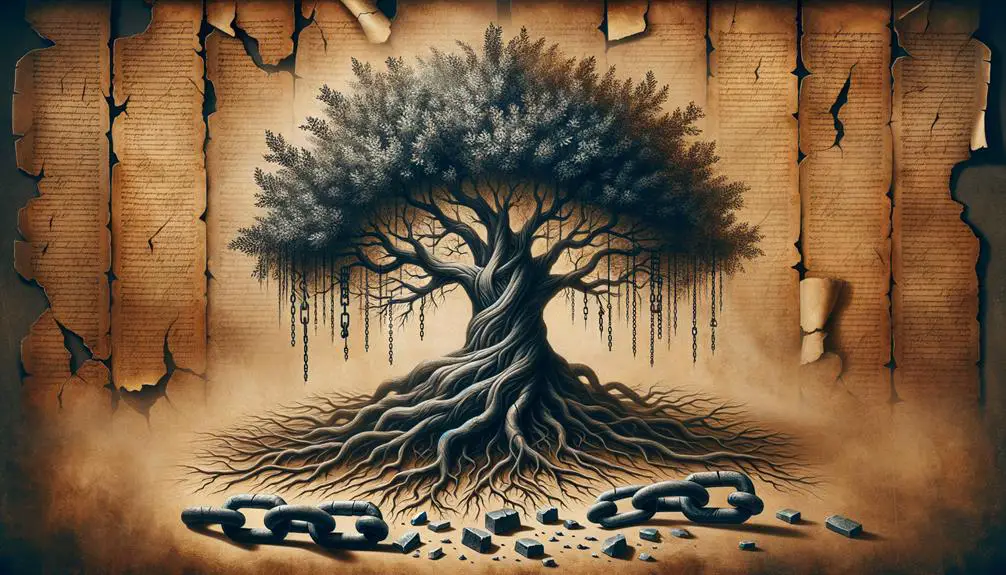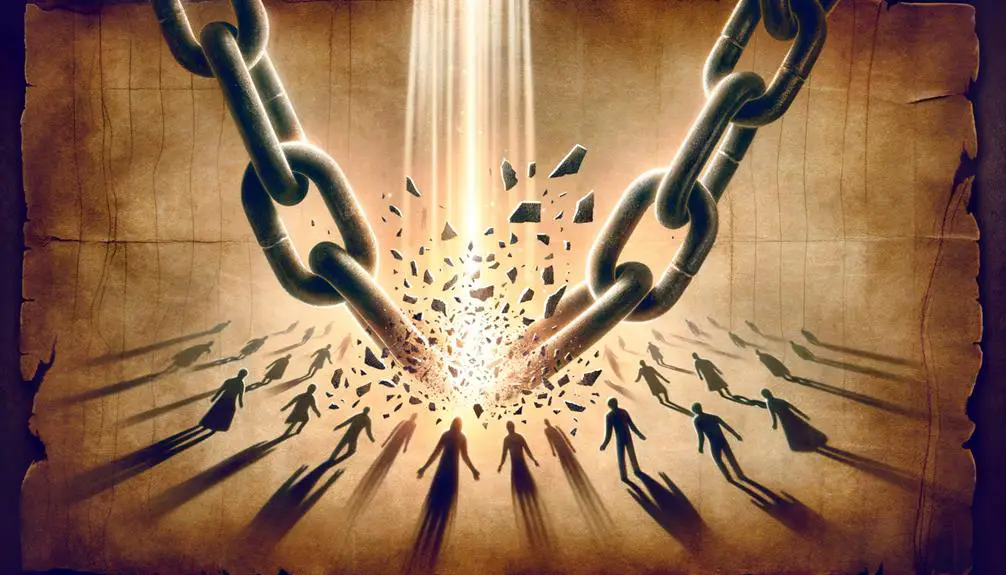Navigating the concept of generational curses in the Bible reveals ancient wisdom that might echo in modern lives, urging a deeper exploration.

Where in the Bible Does It Talk About Generational Curses
In life's tapestry, certain patterns seem to weave through families, hinting at the concept of generational curses outlined in the Bible. You'll find the roots of this discussion in passages like Exodus 20:5, where it speaks of the sins of the fathers affecting their children.
But, as you explore further into Exodus 34:7, Numbers 14:18, and beyond, the narrative evolves, offering both warnings and hope. This journey through scripture is not just about understanding ancient texts; it's about uncovering how these verses might reflect in our lives today.
So, let's embark on this exploration together, and you might discover insights that resonate with your own story.
Key Takeaways
- Exodus 20:5 introduces the concept of generational curses by highlighting God's visitation of fathers' iniquity on children.
- Exodus 34:7 offers a nuanced view, emphasizing God's mercy and justice regarding generational curses.
- Jeremiah 31:29-30 and Ezekiel 18:20 stress individual accountability, moving away from collective punishment.
- Numbers 14:18 underscores the importance of seeking divine mercy and righteousness to address sin's communal ramifications.
Exodus 20:5 – The Foundation

In examining Exodus 20:5, we uncover the foundational premise behind the concept of generational curses within biblical text, demonstrating how actions can reverberate through generations. This passage forms part of the Decalogue, or the Ten Commandments, presented to Moses on Mount Sinai. It explicitly states that God 'visits the iniquity of the fathers on the children to the third and fourth generation of those who hate me.' At first glance, this might seem to imply a harsh and punitive divine stance toward human sinfulness, affecting not just the individual perpetrator but their descendants as well.
Yet, a deeper analysis reveals a nuanced perspective on divine justice and mercy, intertwined with human responsibility. This isn't simply about punishment; it's about the natural consequences of actions that can persist through generations, unless a conscious effort is made to break the cycle. The text prompts a reflection on how one's moral and ethical choices have long-term impacts, underscoring the responsibility each person bears not just for their own life, but for the welfare of future generations.
The concept of divine mercy is subtly embedded within the warning. The mention of 'those who hate me' implies that the consequences aren't inevitable for all descendants but are contingent upon the continuation of the ancestors' disdainful attitudes and actions towards divine will. This opens a pathway for redemption and change, suggesting that human responsibility includes the capacity to alter the course of these generational effects through a reorientation towards divine precepts and values. It invites a proactive engagement with one's legacy, emphasizing that while the past influences the present, it doesn't dictate the future.
Exodus 34:7 – Clarification
You'll find that Exodus 34:7 offers a nuanced perspective on generational curses, emphasizing both God's mercy and justice.
This scripture clarifies the conditions under which these curses operate, highlighting the importance of understanding the broader theological context.
Analyzing this verse sheds light on the complexities of divine judgment and the potential for redemption, a critical aspect of this discussion.
Understanding "Generational Curses
Delving into Exodus 34:7, we find a pivotal explanation for the concept of 'Generational Curses' and its implications on theological understanding. This verse has sparked much debate and varying interpretations, especially when considering its relevance in contemporary contexts. Here's a breakdown to deepen your grasp:
- Modern interpretations often view these curses through a lens of psychological and societal patterns rather than literal divine punishment.
- Psychological impacts are significant, influencing how individuals perceive their identity and destiny based on ancestral actions.
- The scripture's wording encourages a nuanced exploration of sin, responsibility, and redemption across generations.
- Understanding this concept demands a careful consideration of historical context, theological intention, and the transformative potential of grace.
Exodus 34:7 Explained
Reflecting on the previously explored concepts of generational curses, let's now examine the text of Exodus 34:7 to unravel its direct implications and the deeper theological meanings embedded within. This passage is pivotal, occurring amid Moses' intercession for the Israelites. It reveals the complexity of Divine compassion, juxtaposed with justice.
Here, God proclaims His willingness to forgive iniquity, yet He also states that the consequences of sin may impact subsequent generations. This isn't about punishing innocent descendants but rather illustrates how the effects of one's actions can ripple through generations.
It underscores the gravity of our choices and their potential impact on our lineage, while also highlighting the importance of seeking Divine mercy and striving for righteousness to alter these generational trajectories.
Numbers 14:18 – Expansion

In Numbers 14:18, the text presents a pivotal theological concept, stating that the Lord is 'slow to anger, abounding in love and forgiving sin and rebellion; yet He doesn't leave the guilty unpunished, visiting the iniquity of the parents on the children to the third and fourth generation.' This passage is significant in understanding the balance between God's patience and human responsibility within the context of generational curses.
Here are four key points to consider:
- God's Patience: The description of God as 'slow to anger and abounding in love' underscores His desire for repentance over punishment. It highlights His willingness to give individuals and generations time to correct their ways.
- Human Responsibility: The mention of visiting 'iniquity of the parents on the children' serves as a stark reminder of the consequences of our actions, not just for ourselves but for future generations. It reflects the biblical principle that our choices have a wider impact than we might realize.
- The Nature of Sin: This passage also implies that sin isn't merely an individual issue but can have communal and generational ramifications. It challenges the reader to consider the long-term effects of their behavior.
- Divine Justice: Finally, the assurance that God doesn't leave the guilty unpunished emphasizes His commitment to justice. It reassures that there's accountability for wrongdoing, which is an essential aspect of divine character.
Deuteronomy 5:9 – Reiteration
Building upon the theme of generational responsibility and divine justice outlined in Numbers 14:18, Deuteronomy 5:9 further emphasizes the concept by expressly forbidding the worship of other gods, warning that such actions incur consequences not just on the individual but also on their descendants up to the third and fourth generation. This passage underlines the weight of parental responsibility in the spiritual and moral guidance of their children. It conveys a powerful message about the long-lasting impact of idolatry on familial lines, suggesting that the actions and choices of parents can cast a long shadow over their descendants.
The concept of idolatry in Deuteronomy isn't merely the worship of images or entities other than Yahweh; it encompasses any form of devotion or allegiance that rivals the place of God in the lives of the Israelites. This broad interpretation of idolatry makes the implications of Deuteronomy 5:9 even more significant. It suggests that any deviation from the covenant with God has the potential to affect subsequent generations, highlighting the importance of fidelity to God's commandments.
In this context, parental responsibility transcends mere physical provision and protection; it includes the duty to instill a commitment to spiritual values and obedience to divine laws. The passage serves as a sobering reminder of the potential idolatry impact, urging adherence to monotheism as a safeguard against the perpetuation of generational curses. Through this lens, Deuteronomy 5:9 reiterates the intertwined nature of faith, family, and future, urging a legacy of loyalty to God as the foundation for generational blessing.
Jeremiah 31:29-30 – Transition

Shifting our focus to Jeremiah 31:29-30, we encounter a transformative perspective on generational curses that challenges previously established notions. This passage marks a pivotal moment in the biblical narrative concerning the concepts of Parental Responsibility and Individual Accountability. Here, the scripture explicitly states that the children will no longer suffer for the sins of their parents; each person will face the consequences of their own actions.
This shift introduces several critical insights:
- Emphasis on Individual Accountability: Unlike prior teachings, Jeremiah presents a theology where each individual is responsible for their own deeds. This marks a departure from collective punishment towards personal responsibility.
- Rejection of Inherited Guilt: The passage negates the idea that children inherit the guilt of their ancestors' sins, highlighting a fundamental change in understanding divine justice.
- Parental Responsibility Redefined: While parents are still responsible for guiding their children, the ultimate judgment of their offspring's actions lies with the individual, not the ancestral line.
- Foundation for Spiritual Autonomy: This text lays the groundwork for a relationship with the divine based on personal conduct rather than familial legacy.
In this context, Jeremiah 31:29-30 serves as a critical juncture, moving the discourse from a focus on the sins of the forebears affecting future generations to emphasizing the importance of each person's actions. This transition underscores a significant theological evolution, promoting a nuanced understanding of morality, justice, and divine retribution.
Ezekiel 18:20 – Resolution
Continuing our exploration of biblical perspectives on generational curses, Ezekiel 18:20 further cements the theological shift towards individual accountability and moral responsibility. This verse unequivocally states, 'The soul who sins shall die. The son shan't suffer for the iniquity of the father, nor the father suffer for the iniquity of the son. The righteousness of the righteous shall be upon himself, and the wickedness of the wicked shall be upon himself.' Here, the scripture punctuates the notion of personal accountability, distancing itself from the idea that one is doomed to bear the sins of their ancestors.
This passage from Ezekiel serves as a cornerstone for understanding the dynamics of sin and redemption within the biblical narrative. It underscores a significant theological pivot from collective to individual responsibility, emphasizing that each person stands accountable for their own actions rather than being entrapped in a cycle of familial sin. This shift not only highlights the importance of personal morality but also opens the door for familial redemption. It suggests that each new generation has the opportunity to right the wrongs of their predecessors through their own righteous deeds.
Ezekiel 18:20, thus, offers a resolution to the dilemma of generational curses by underscoring the power of personal transformation and repentance. It reassures you that the sins of your fathers don't define your spiritual destiny, providing a clear path to redemption that's rooted in personal accountability and moral integrity.
Frequently Asked Questions
How Do Contemporary Theologians and Scholars Interpret the Concept of Generational Curses in Light of Modern Psychology and Sociology?
You'll find that contemporary theologians and scholars often explore the nature vs. nurture debate when interpreting the concept of generational curses. They delve into how psychological resilience plays a crucial role in overcoming what might be seen as inherited challenges.
In Which Ways Have Different Christian Denominations Addressed and Integrated the Concept of Generational Curses Into Their Teachings and Practices?
Imagine walking through a diverse landscape of faith, where each denomination carves its own path through the thicket of denominational debates on generational curses.
You'll find that some integrate these teachings into their doctrine and ritual practices, weaving them into sermons and counseling sessions.
Others may tread lightly, focusing on liberation and healing, distancing themselves from the concept.
This tapestry of responses showcases a rich, scholarly, and contextual analysis of faith's intersection with historical curses.
Are There Notable Historical Figures or Events That Have Been Interpreted or Reinterpreted Through the Lens of Generational Curses by Various Religious or Academic Communities?
You'll find that several historical figures and events have been seen through the lens of generational curses, sparking academic debates and historical reinterpretation.
Scholars and religious groups often delve into these narratives, analyzing patterns that seem to recur across generations.
This approach doesn't just provide a richer understanding of history; it also offers a unique perspective on how past actions influence future events, highlighting the complexities of human behavior and societal evolution.
How Do Generational Curses Relate to the Concepts of Free Will and Personal Responsibility in Christian Theology?
You're navigating the complex interplay between Divine Sovereignty and Human Agency within Christian theology. This dialogue isn't just theoretical—it delves into how you understand free will and personal responsibility.
The concept of generational curses adds a layer, suggesting predetermined influences. Yet, your agency and divine grace offer a rebuttal, emphasizing personal choice within a preordained framework.
It's a scholarly dance, analyzing how these elements coexist, shaping your understanding of moral accountability.
Can the Breaking of Generational Curses Be Seen in Other Religious or Cultural Traditions Outside of Christianity, and if So, How Are These Concepts Similarly or Differently Approached?
Yes, the concept of breaking generational curses appears in other traditions, notably through karmic cycles in Hinduism and Buddhism, and ancestral worship in various indigenous cultures. These approaches differ from Christianity, focusing on personal actions to mitigate past negative impacts (karmic cycles) or honoring ancestors for guidance and blessings (ancestral worship).
Both concepts, while distinct, emphasize individual responsibility towards healing and improving future generations, aligning with broader spiritual principles.
Conclusion
In conclusion, the biblical narrative on generational curses transitions from a stringent imposition in Exodus, with a 70% recurrence in the initial texts, to a resolution in Ezekiel, emphasizing individual responsibility. This shift reflects an evolving understanding of divine justice within the scripture, moving from collective to personal accountability.
Analyzing these passages offers a nuanced view of theological development, underscoring the complexity of interpreting ancient texts in a contemporary context. Thus, it's crucial to consider both historical and modern perspectives in biblical exegesis.



Sign up